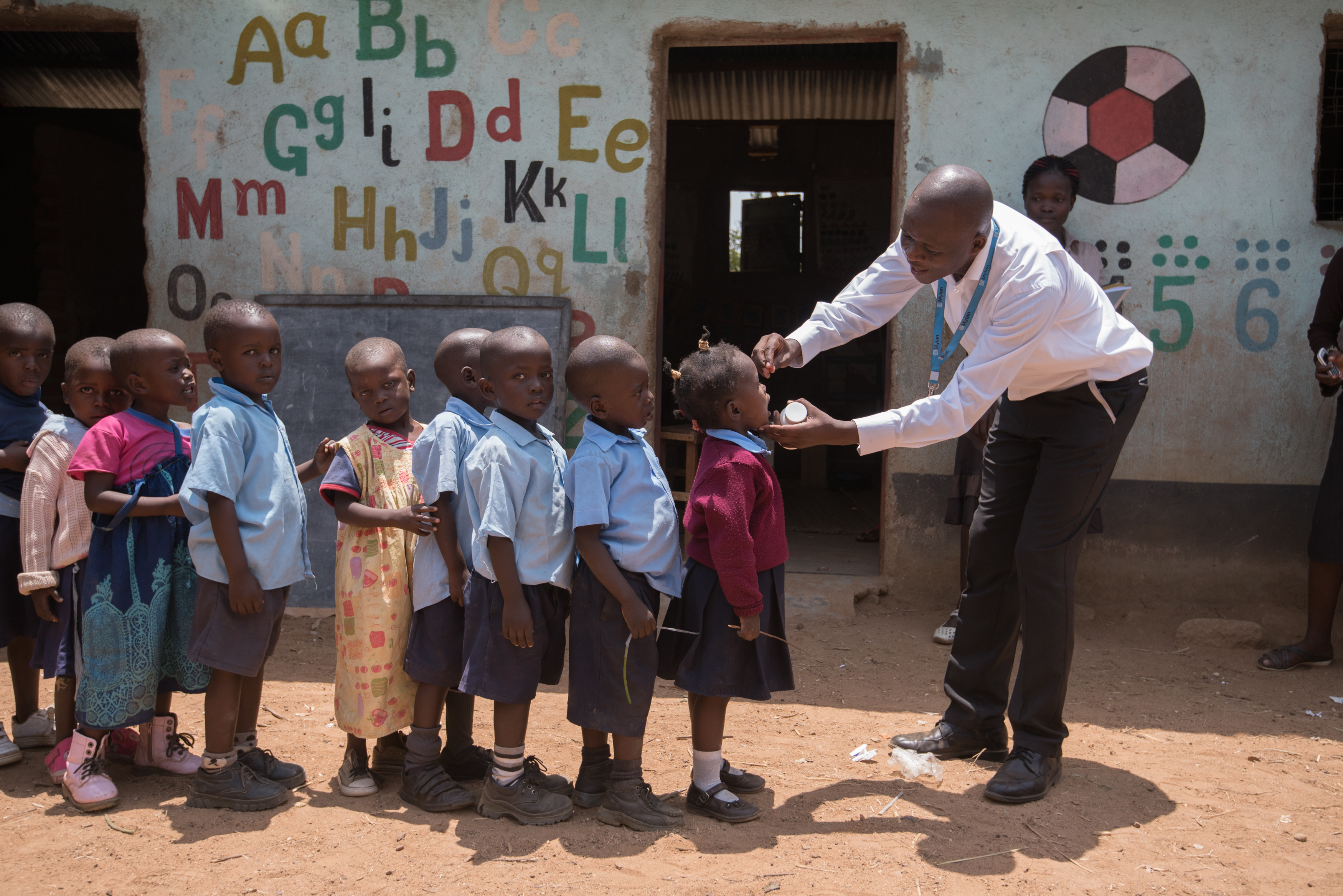
Photo: Allan Gichgi/MCSP
GREETINGS from the TASK FORCE SECRETARIAT
Dear Friends,
The pandemic may still be with us, but we are unbroken in the resolve to meet the health needs of the populations we serve. The focus on maintaining essential health services while responding to the COVID-19 pandemic continues to be at the forefront of our discussions and resource sharing. Thank you for presenting your work, participating in discussions, and for sharing resources with your networks.
In the issue we touch on the Steering Committee's virtual meeting held in September 2020; the annual members' survey; webinar data from COVID-19 resources; and the QoC/M&E subgroups' draft review of the pediatric quality of care indicators. I hope that you will find the information useful. Stay safe.
Sincerely,
Dyness Kasungami, Director of the Child Health Task Force
THE CHILD HEALTH TASK FORCE STEERING COMMITTEE MEETING

The Task Force's Steering Committee gathered virtually on September 2-3rd for its bi-annual meeting to share progress achieved from January-August 2020, review the PY3 workplan, and discuss a country engagement strategy.
Select action items for the future included:
- Furthering the country engagement process:
- Select 1-2 countries, leverage existing partnerships, and examine resource needs to ensure virtual participation from countries to create country-led priorities
- Map existing partners in-country for the country engagement process and identify their resource needs to participate virtually
- Identifying subgroup work highlights for the upcoming CORE Group conference
- Exploring funding for the child health agenda via advocacy for a broader health systems approach.
Full meeting notes can be found here.
ANNUAL TASK FORCE MEMBERS' SURVEY
In August, the Secretariat conducted its annual members' survey to solicit feedback on the Task Force's progress to date and to gauge members' thoughts on the usefulness of the resources and support offered. Thank you to all who took the time to complete the survey! Below is a snapshot of the preliminary survey results:
- We received a total of 63 responses from 23 different countries
- In the 12 months preceding the survey, the three subgroups that had the most participation from respondents included Quality of Care, Nutrition, and Institutionalizing iCCM
- Most respondents (43) either strongly agreed or agreed that the Task Force is on track to achieve its goal:
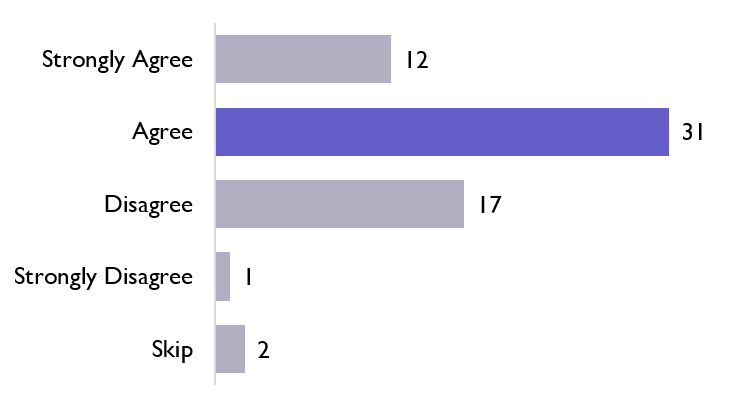
- Respondents appreciate the various resources and support offered, in particular the Task Force's work in the two themes of learning and sharing evidence on child health programming and coordination and collaboration on child health were rated highly.
- Respondents indicated an appetite for real country engagement and for more resources and events in the French language.
A full report on the survey results is forthcoming and the Secretariat will host a webinar to discuss the findings and next steps.
SYNTHESIS OF COVID-19 RESOURCES
With the outbreak of COVID-19, the Task Force created a dedicated resource page on its website to provide members and other child health stakeholders access to up-to-date research, guidelines, and information on how countries are responding. Additionally, in April the Task Force began a bi-weekly webinar series on child health and the COVID-19 response, with each session hosted by a different subgroup.
The Secretariat compiled participant stats and feedback it had received on the series thus far to share the following takeaways.
Takeaways from the webinar Series:
- Webinars have been highly attended, indicating the interest and relevance to members' work.
- Global participants (USA, Canada, Europe, and Australia): 360
- LMIC participants: 200
- Presentations are primarily country-based and members have expressed their appreciation for the presence of country-based experts.
- Key issues that have been raised:
- Inadequate PPE
- Health workers staying up-to-date with rapidly changing protocols
- General lack of focus on mental health of the population, caregivers, and health workers
- Unintended consequences of lockdowns, such as fear of contracting COVID-19 hindering care-seeking
- Health workers' lack of transportation and/or fear of harassment.
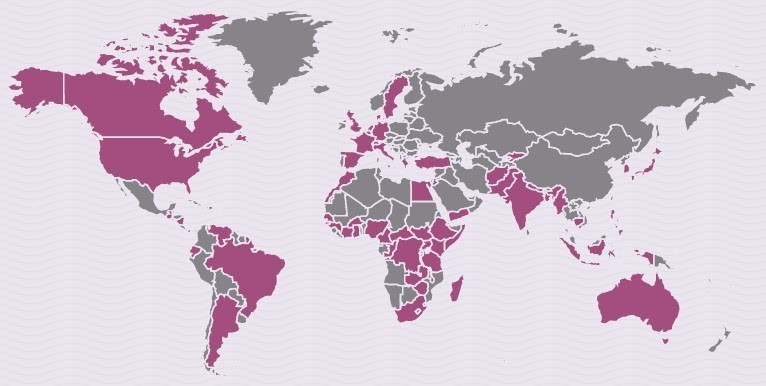
Location of webinar attendees
Resources from All Previous Webinars
- April 23, 2020 - Experiences from Bangladesh and Pakistan
- Recording (password: 9Y&1?%y^)
- Presentation
- May 7, 2020 - Community Response Efforts
- Recording (password: 7Z^@AL^%)
- Presentations: Unicef & Medic Mobile
- May 21, 2020 - Partner Collaboration in the Response
- June 12, 2020 - Challenges and Opportunities for Digital Health
- Recording (password: 6Y!6w820)
- Presentation
- June 30, 2020 - Community Based Service Delivery During the Pandemic in Fragile and Humanitarian Settings
- Recording (password: 0F=29U%2)
- Presentations: CHW Scoping Review & Somalia Experience
- July 16, 2020 - Delivering Seasonal Malaria Chemoprevention in the Context of COVID-19 / Comment faire la Chimioprévention du Paludisme Saisonnier en temps de COVID-19
- Recording (password: 8z=46&1^)
- Presentation
- August 13, 2020 - Impact and Lessons Learned for In-Country Private Sector Health Products Supply Chains
- Recording (password: smV7a0@k)
- Presentations: Impact on PS Supply Chains & Hewatele
- October 1, 2020 - A Global Perspective on the Impact of COVID-19 on Child Education and Development: Experiences from India, Kenya and the United States
- Recording (password: 5s15=#r3)
- Presentation
The next webinar, Continuing Essential Health Services During the Pandemic: Ethiopia's Experience, will be held on October 13th. We encourage you to continue to check the resource page as new items and previous webinar recordings are added regularly.
If you have a resource that you would like to share please email: childhealthtaskforce@jsi.com
SUBGROUP HIGHLIGHT: Quality of Care and M&E Subgroups
In a joint and speedy effort, the Quality of Care and M&E subgroups facilitated the review of draft indicators for pediatric Quality of Care to accompany the 2018 WHO Standards to improving the quality of care for children and young adolescents in health facilities.
Approximately 45 members across the two subgroups joined a series of live discussions and provided written feedback and recommendations to a set of 19 core indicators that are meant to be common indicators to be used across countries for monitoring of QoC efforts and learning. Over the coming months, the subgroup chairs will identify ways to continue to support the finalization, as well as conduct a feasibility study of the proposed indicators with WHO. Chairs will engage and update working group members on the process as it unfolds.
SUBGROUP UPDATES
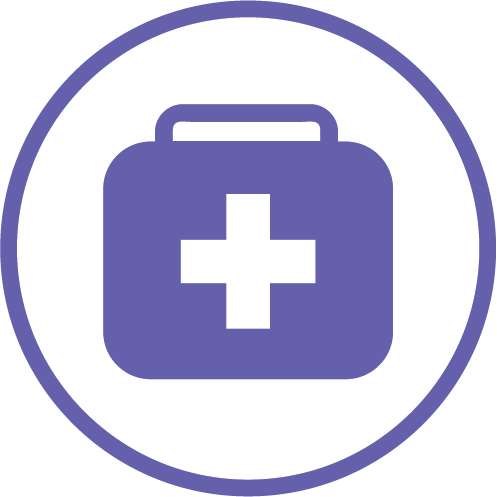 Child Health in Emergencies and Humanitarian Settings: The subgroup led the 5th webinar in the Child Health & COVID-19 Series, held on June 30. The webinar focused on community-based service delivery during the pandemic in fragile settings and featured presentations on a CHW scoping review and the experience in Somalia. While almost all populations across the globe have suffered due to COVID-19, ensuring continued provision of essential services has been most difficult for the most marginalized and deprived populations who are often living in fragile contexts. The webinar sought to explore challenges and share lessons of effective delivery of services in these contexts that can be replicated elsewhere. A recording of the webinar is available here (password: 0F=29U%2).
Child Health in Emergencies and Humanitarian Settings: The subgroup led the 5th webinar in the Child Health & COVID-19 Series, held on June 30. The webinar focused on community-based service delivery during the pandemic in fragile settings and featured presentations on a CHW scoping review and the experience in Somalia. While almost all populations across the globe have suffered due to COVID-19, ensuring continued provision of essential services has been most difficult for the most marginalized and deprived populations who are often living in fragile contexts. The webinar sought to explore challenges and share lessons of effective delivery of services in these contexts that can be replicated elsewhere. A recording of the webinar is available here (password: 0F=29U%2).
![]() Digital Health and Innovations: The subgroup is planning an upcoming meeting to discuss platforms and functions that can be used for COVID-19 case management and contact tracing. This discussion is a follow up to a Global Digital Health Network session in July. More information to come.
Digital Health and Innovations: The subgroup is planning an upcoming meeting to discuss platforms and functions that can be used for COVID-19 case management and contact tracing. This discussion is a follow up to a Global Digital Health Network session in July. More information to come.
 Implementation Science: On October 1st, the subgroup held a webinar that focused on the impact of the pandemic on education and children with disabilities as part of the Child Health & COVID-19 Series. The webinar featured three pediatricians from India, Kenya, and the United States. They shared challenges and lessons learned from their respective country experiences, advocating for access to education and health for children with disabilities and their families during COVID-19. A recording of the webinar is available here (password: 5s15=#r3).
Implementation Science: On October 1st, the subgroup held a webinar that focused on the impact of the pandemic on education and children with disabilities as part of the Child Health & COVID-19 Series. The webinar featured three pediatricians from India, Kenya, and the United States. They shared challenges and lessons learned from their respective country experiences, advocating for access to education and health for children with disabilities and their families during COVID-19. A recording of the webinar is available here (password: 5s15=#r3).
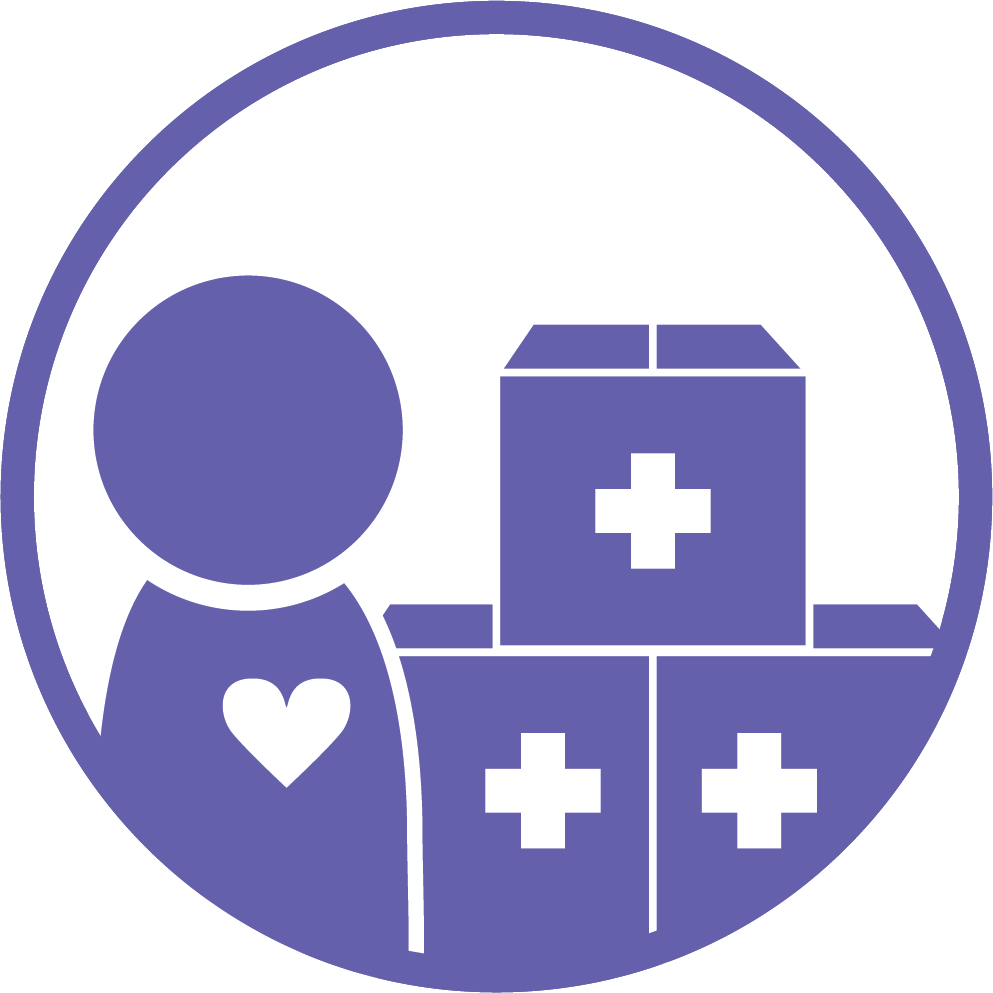 Newborn and Child Health Commodities: The co-chairs have finalized a MNCH commodities survey tool through a vetting process involving key stakeholders. The tool will be used to complete a landscape of MNCH commodities and identify gaps to focus the subgroup's work.
Newborn and Child Health Commodities: The co-chairs have finalized a MNCH commodities survey tool through a vetting process involving key stakeholders. The tool will be used to complete a landscape of MNCH commodities and identify gaps to focus the subgroup's work.
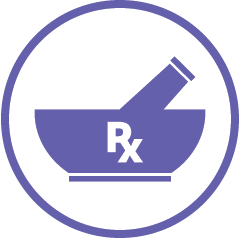 Private Sector Engagement: The subgroup hosted a webinar on August 13th that focused on how a local company in Kenya is ensuring availability and safety of affordable oxygen to health institutions. A recording of the webinar is available here (password: smV7a0@k). The subgroup hosted a second webinar on partnerships in adolescent health on September 30th, which featured a professor of epidemiology at Georgia State University. The event focused on the importance of sharing data on the harms of alcohol use among youth in a global context, using a NGO-academic partnership in Uganda as a case study. A recording of the webinar is available here (password: eVE3!f+e). The subgroup will host a meeting on October 29th to share and discuss the findings from the Child Health and Nutrition Research Initiative (CHNRI) led by the SHOPSplus project, Boston University, and USAID. More information to come.
Private Sector Engagement: The subgroup hosted a webinar on August 13th that focused on how a local company in Kenya is ensuring availability and safety of affordable oxygen to health institutions. A recording of the webinar is available here (password: smV7a0@k). The subgroup hosted a second webinar on partnerships in adolescent health on September 30th, which featured a professor of epidemiology at Georgia State University. The event focused on the importance of sharing data on the harms of alcohol use among youth in a global context, using a NGO-academic partnership in Uganda as a case study. A recording of the webinar is available here (password: eVE3!f+e). The subgroup will host a meeting on October 29th to share and discuss the findings from the Child Health and Nutrition Research Initiative (CHNRI) led by the SHOPSplus project, Boston University, and USAID. More information to come.
![]() Re-imagining the Package of Care for Children: Formerly the Expansion of the Child Health Package Subgroup, the subgroup officially re-launched on July 8th with a meeting to review and discuss the subgroup's updated TOR and a presentation of the Task Force-commissioned position paper, Synthesis of Findings on Integrated Packages for Child Health Services. The co-chairs hosted a webinar on September 29th featuring Healthy Learners, an NGO using school-based community health to promote child health in Zambia. The co-founders shared their experiences helping schools re-open in the context of COVID-19, including the guidelines and resource package they developed with the Zambian government. The webinar also featured the Country Director of PCI in Guatemala, and a health expert from UNICEF NY/HQ, shedding light on the impact of COVID-19 on child health and education from a global perspective. A recording of the webinar is available here (password: .3G9JvAn).
Re-imagining the Package of Care for Children: Formerly the Expansion of the Child Health Package Subgroup, the subgroup officially re-launched on July 8th with a meeting to review and discuss the subgroup's updated TOR and a presentation of the Task Force-commissioned position paper, Synthesis of Findings on Integrated Packages for Child Health Services. The co-chairs hosted a webinar on September 29th featuring Healthy Learners, an NGO using school-based community health to promote child health in Zambia. The co-founders shared their experiences helping schools re-open in the context of COVID-19, including the guidelines and resource package they developed with the Zambian government. The webinar also featured the Country Director of PCI in Guatemala, and a health expert from UNICEF NY/HQ, shedding light on the impact of COVID-19 on child health and education from a global perspective. A recording of the webinar is available here (password: .3G9JvAn).
Call for interested members to chair the Institutionalizing iCCM Subgroup
There is an opportunity to serve as a co-chair of the Institutionalizing iCCM subgroup, and contribute to moving the agenda of the Task Force forward. You can express interest to lead as an individual or as an organization and you can also nominate someone with their consent.
Please review the terms of reference for the subgroup co-chairs and visit the www.childhealthtaskforce.org for the Task Force and subgroup TORs and workplans. While the time commitment is not huge, it does require one to dedicate a couple of hours each month for teleconferences or to review documents.
Email dyness_kasungami@jsi.com directly to express interest, with a note why you are interested and your short resume. Please also email childhealthtaskforce@jsi.org if you have any questions or need clarification about the role.

NEWS FROM THE NETWORK
-
Brief: Beyond Survival: Raising the Quality of Care for Children and Adolescents
The second brief in JSI's series on child health, Beyond Survival, is authored by Michel Pacqué. JSI's approach to supporting the health of women and children is rooted in a life-course perspective and recognizes that biological, behavioral, environmental, and socio-economic factors determine health outcomes. Health equity is therefore integral to our work. -
Report: The Human Capital Index 2020 Update: Human Capital in the Time of COVID-19
This World Bank report presents an update to the Human Capital Index (HCI), using the most recent health and education data available as of 2020. It documents new evidence on trends over time in the HCI, examples of success, and new analytical work on utilization of human capital, as well as a primer on the COVID-19 pandemic and its potential impact on human capital. -
Report: 2020 Goalkeepers Report: COVID-19 A Global Perspective
Available in multiple languages, this report from the Bill & Melinda Gates Foundation examines the impact of COVID-19 on the SDGs and argues for a collaborative response. -
WHO Call for Proposal: Consultancy on Implementation Guidance on Home-Based Record for MNCH
Purpose of work: To provide support to World Health Organization (WHO) in developing practical implementation guidance directed to maternal, newborn and child health (MNCH) programme managers and policy makers at global, regional and country level to address a broader MNCH content for the optimal use of home-based records including how to design and promote their use among health workers and women/caregivers. Deadline for application: October 14th -
WHO Requisition: Research Scientist position in the Adolescent and Young Adult Health Team
Objective of program: To support high-burden countries to ensure evidence-based policies and strategies are in place to achieve universal access to high quality health services for maternal, newborn, child and adolescent health and ageing (MNCAH&A), and increase coverage and quality of effective MNCAH&A interventions among pregnant women, newborns, children, adolescents, young adults and older people, and to create mechanisms to measure the impact of those strategies. Closing Date: October 23
If you have announcements, resources, or other information to share, please email: childhealthtaskforce@jsi.com to be included in the next newsletter.

UPCOMING EVENTS
-
October 13, 2020, 8-10am EDT, online | Continuing Essential Health Services During the Pandemic: Ethiopia's Experience. The ninth webinar in the Task Force's Child Health & COVID-19 series, the event will share how the Government of Ethiopia is working with partners to ensure the continuation of essential health services, including life-saving interventions for children during COVID-19. Presenters will include representatives from the Ministry of Health, UNICEF Country Office, and USAID TRANSFORM Primary Health Care project.
- December 8-10, online | CORE Group Global Health Practitioners' Conference
The Child Health Task Force is a proud sponsor of this year's conference that will explore the theme, "Unlocking Potential: Prioritizing Child and Adolescent Health in the Next Decade."The Task Force is engaging subgroups to propose topics to put forward as a track or concurrent session for the conference's agenda, focused on how our work can support accelerating achieving the 2030 vision for children and adolescents. We will also be hosting a virtual booth in the conference marketplace where we will share information and materials on our network and subgroup work.
